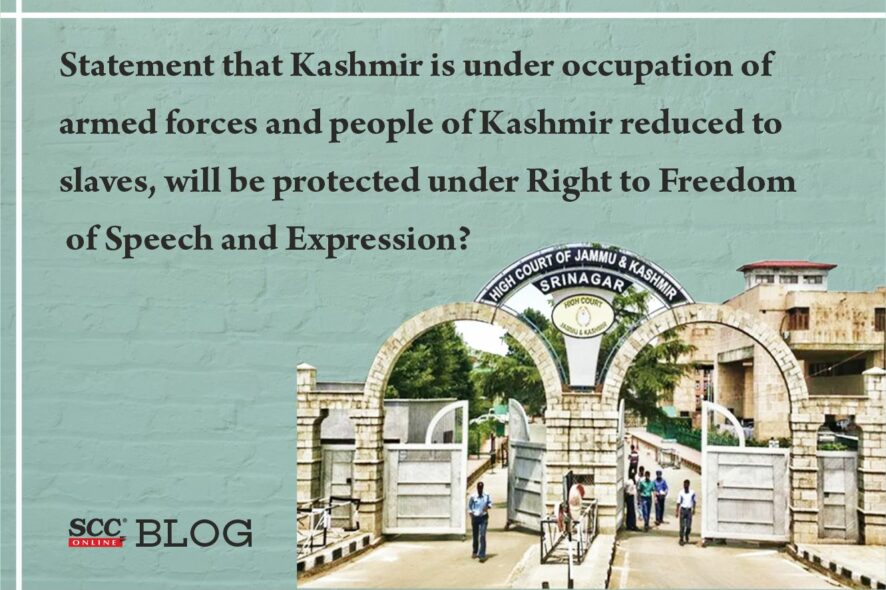Jammu and Kashmir and Ladakh High Court: Stating that, the intention of a person can be gathered from the words spoken or written or other expressions, Sanjay Dhar, J., expressed that,
Expression of outrage at the negligence and inhuman attitude of the security forces, police and establishment would come within the ambit of freedom of expression of an individual which includes freedom to criticize the Government of the day which is permissible under law but the same may not be the position if an individual questions the fact of a State being a part of the Country by using the expression ‘occupation of military or the people being slaves etc.
The petitioner had challenged an FIR for the offence under Section 13 ULA(P) Act.
In the petition, it was stated that, the petitioner was an advocate practising for last about 10 years. In 2018, six civilians were killed and more than 60 injured men, women and children in a blast.
Further, it was averred that the petitioner being a resident of the village in which the tragedy had happened, made certain comments regarding the incident on Facebook. According to the petitioner, the theme of the said posts was that there had been negligence which led to the killing of the above-said civilians and that the District Police, Kulgam, and the local administration were principally responsible for the same.
Petitioner submitted that, there was nothing illegal in the posts which were uploaded by him on his Facebook, but an impugned FIR was registered branding the petitioner as an anti-national element.
Analysis, Law and Decision
High Court on perusal of Section 13 of ULA(P) Act stated that a person can be punished for unlawful activities, if he takes part in or commits, advocates, abets, advises or incites the commission of unlawful activity. Even if a person assists any unlawful activity of any association declared as unlawful, he can be subjected to punishment under the aforesaid provision.
The Bench noted that some portions of the first post highlighted that the petitioner advocates that the people of Kashmir are slaves, and it is under occupation which is like cancer. The other post indicated that the petitioner was advocating that this part of the country was under the occupation of the Indian Military.
In Court’s opinion, the freedom of speech and expression guaranteed under the Constitution cannot be stretched to such a limit as to allow a person to question the status of a part of the country or its people.
It is one thing to criticize the Government for its negligence and express outrage on the violation of human rights of the people but it is quite another to advocate that the people of a particular part of the Country are slaves of the Government of India or that they are under occupation of armed forces of the Country.
The Bench expressed that, the petitioner was advocating and supporting the claim that Jammu and Kashmir were not a part of India and that it was occupied by the Indian military with the people having been reduced to the status of slaves. Thus, he was questioning the sovereignty and territorial integrity of the Country.
“…petitioner by uploading these posts has cross the Lakshman Rekha which demarcates the freedom of expression guaranteed under Article 19 of the Constitution of India from the reasonable restrictions imposed on such freedom on the ground of sovereignty and integrity of India.”
Hence, the petitioner’s act, prima facie fell within the definition of ‘unlawful activity’ as contained in Section 2(o) of the ULA(P) Act punishable under Section 13 of the Act.
Lastly, the Court held that quashing the proceedings at present would amount to stifling a genuine prosecution, which is not permissible in view of the Supreme Court decision in Neeharika Infrastructure Pvt. Ltd. v. State of Maharashtra, 2021 SCC Online SC 315. Therefore, the petition was dismissed. [Muzamil Butt v. State of J&K, 2022 SCC OnLine J&K 272, decided on 22-4-2022]
Advocates before the Court:
For the Petitioner: M.A. Qayoom, Advocate
For the Respondent: Asifa Padroo, AAG








I feel both parties are wrong in one way or other way. Freedom of armed forces also accountable.